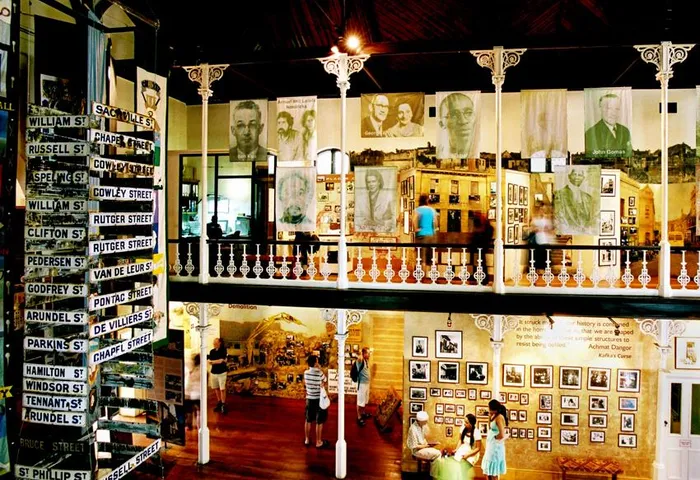Understanding Heritage Day: Insights from the District Six Museum

District Six Museum
Image: District Six Museum
"When it comes to Heritage Day, it is never about wearing our identity like a costume or a parade," Chrischene Julius told IOL.
In South Africa, the day has increasingly been branded as “Braai Day,” a convivial occasion centred around food, music, and community gathering. While Julius acknowledges the importance of these elements in fostering social cohesion, she urges us to see beyond the superficial festivities.
“Food and braai do bring us together,” she concedes, “but are we truly celebrating heritage, or are we performing it because it’s convenient for programming or optics?”
For many South Africans, Heritage Day remains a complex mosaic of memories, pain, and hope. While public celebrations often emphasise pride and unity, beneath the surface lie stories of loss, displacement, and inherited trauma that are often left unspoken.
Heritage as a living, evolving concept
One of the most interesting ideas Julius shared is that heritage is not static. It is a living process that evolves with each generation, noting that “Heritage is a verb, it’s something we actively shape, reimagine, and carry forward. It’s not just about the past; it’s about how we understand ourselves today and what we want to build for tomorrow.”
Reflecting on the ongoing histories and realities of District Six, Chris speaks of how today's younger generation is eager to embrace its past. Even if they didn’t experience the forced removals firsthand, they understand the symbolism and significance of the space. Heritage is both inherited and imagined. It manifests in names, language, food, and symbols, as well as in gaps and silences.
Her words reminded me that heritage isn’t merely about preserving old customs or relics. It’s about continuous dialogue, reinterpretation, and sometimes, re-creation.
“My surname is Julius,” she shared, “a name rooted in slavery. I can’t trace it back with certainty, but I know what it means. Sometimes, we have to allow ourselves to reimagine our connections to the past and use those stories to forge new identities.”
Museums as mirrors and spaces for conversation
In an era when institutions like museums question their relevance, the District Six Museum remains a crucial space for memory and resistance. It serves as a repository of artefacts and a venue for dialogue and reflection.
She emphasises that Heritage Day is an ideal moment to start these conversations. “It’s a chance to challenge narratives, confront uncomfortable truths, and foster understanding,” she said. “We need to ask ourselves: how do we move beyond the superficial symbols and truly engage with the stories that shape our identities?”
The museum, she added, invites visitors to reflect on their own histories and to acknowledge the shared pain and resilience that define South Africa’s story. “It’s about creating spaces where tough conversations can happen,” she explained.
“Because without honest dialogue, healing remains elusive.”
Bridging the gap between generations and healing the wounds
As an ex-resident of District Six, our discussion naturally turned to the generational divide in the area. As a resident in the area for a few years, I came to observe how younger residents have begun to understand the meaning of reclaiming space with an eagerness to connect with their roots, while elders sometimes feel that their memories are dismissed or misunderstood.
Speaking to Chris, I drew on the misunderstanding between different generations and how they perceive heritage in areas such as District Six, as “older generations hold the memories, but sometimes feel that younger generations don’t value them.”
Julius nodded in agreement, mentioning how this is often due to a gap in communication, as both elders and youth have their own reverences. Elders for their lived experiences, and the youths' desire to belong. But there needs to be space for dialogue, for listening and understanding. "Communities are not static; they are constantly reshaping themselves.
The work of healing and reconciliation has to happen in homes, on streets, and within our institutions," Chris tells IOL. Emphasising that creating these bridges and closing these gaps is essential for a unified national identity. “It’s about acknowledging pain, but also about building hope and resilience through shared stories,” she added.
“Heritage isn’t just about remembering the past; it’s about shaping the future together," Christene tells IOL.
When asked what message she would give to young South Africans about their role in preserving and understanding heritage, Julius offered three guiding principles:
- Be curious — ask your family questions about your roots, your community, and your history.
- Acknowledge injustice — recognise that apartheid and colonial histories have left scars that affect us all, regardless of race or background.
- Engage in Difficult Dialogue — Use your heritage as a bridge, not a barrier; foster conversations that challenge exclusion and promote connection.
“Young people,” she said, “may not carry the trauma of apartheid directly, but they inherit its legacy. It’s up to them to shape what comes next in writing our nation's new tales that embrace diversity, truth, and reconciliation.
Heritage as a calling, not just a celebration
What started as an interview turned into a powerful reflection on belonging, memory, and the work of healing. Julius’s words echoed a vital truth: Heritage Day is more than a celebration; it is a calling.
It’s an invitation to confront our histories, embrace our differences, and build a future grounded in honesty and shared humanity..
Related Topics: